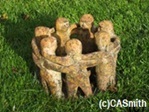Remember the old TV game show $100,000 Pyramid hosted by Dick Clark? Players attempted to guess a category from the descriptions given by their teammate.
Let’s play! Here are my descriptions: a college sorority reunion, a women’s retreat, a high school reunion, the Global Women’s Leadership Network (www.gwln.org). If you answered “women-only events”, you’d hear the incorrect buzzer. My Ohio high school was co-ed and GWLN includes men.
Two months ago, the answer was: groups Camille associates with. Today, the answer is: Camille’s communities. Today’s answer comes from being introduced to a new way of thinking about community, one that has membership based on shared commitments and choice, not geographical proximity or entitlement.
The topic of community may not seem to fit the world of work I usually write about. However, the more I investigate this new view, the more I see fundamental principles that can support any purpose-oriented group working well together to achieve their goals. That’s a fit for me.
What is the new view of community and why is it important?

Community is about the experience of belonging, with belonging having 2 meanings: one, the experience of being connected and among friends and, two, the experience that something belongs to me. What I consider mine, I will build and nurture. … The theory comes down to three everyday questions out of which community is actually lived: 1.) Whom do I choose to invite into the room? 2.) What is the conversation that I both become and engage in with those people? 3.) When there are more than two of us together, how do we create a communal structure that moves the action forward?”
Belonging to a community by choice, not entitlement, is especially important now because we aren’t in Kansas anymore, Toto. Heck, we aren’t even in the good ol’ USofA anymore! Before you call me a commie, let me explain: The historical American individualistic way of being, personified by the lone ranger doing whatever he wanted to the land and people, is no longer sustainable, let alone appropriate. (You’re right, it never was.) The command-and-control, fear-based work culture it spawned is ineffective and dissatisfying for everyone it touches.
Belonging means we are connected and “at home” with each other, unafraid, clear that we have each other’s back. When we belong, we make choices that honor our self, the other and the whole.
What would show up if Block’s 3 questions framed your next office meeting or family gathering? How would you show up?
“Small world, isn’t it?” peppers our daily conversations. That recognition makes our interdependence undeniable and it makes being disconnected impractical, even undesirable.
Whether times are bouncy and uncertain or smooth and clear, the one constant that helps me “forward the action” – meaning, what I am committed to – are my relationships. From this new perspective, I now see these relationships as my communities. None of us succeed by our self. We succeed because people participate with us. Adding belonging to our participation lights up the phrase “we are in this together” with possibility.
Serendipity: In the process of writing this, someone I’ve volunteered with for 6 years asked if I would be her partner in a business opportunity. She said she was asking me because “you’ve always been there for me, always come through. I want this business to be known for quality and commitment. I know you’ll bring that to the coaching we offer.” With this, we began to create ourselves as a community.
Who will you invite into the room?
Subscribe
Get Camille's latest posts!
